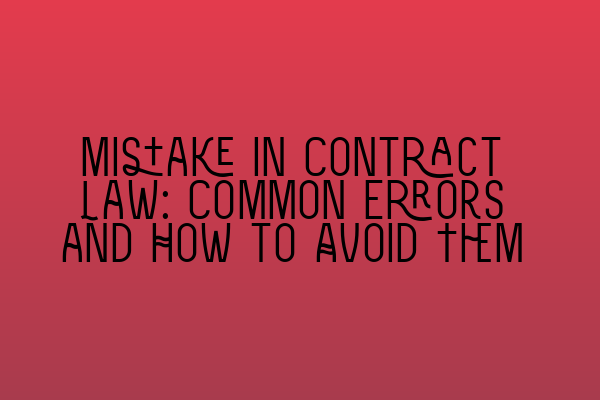Mistake in Contract Law: Common Errors and How to Avoid Them
Contracts are an integral part of business transactions and legal agreements. However, even with the utmost care and attention, mistakes can happen. Understanding common errors in contract law is essential for both solicitors and their clients to protect their interests and prevent unnecessary legal disputes. In this article, we will explore some of the most prevalent mistakes and provide valuable insights into how to avoid them.
1. Ambiguous or Vague Language
One of the most common mistakes in contract drafting is the use of ambiguous or vague language. Unclear terms can lead to differing interpretations, resulting in disputes between parties. To avoid this, solicitors must be diligent in clearly defining all terms and provisions within the contract. Exploring real-life case studies can provide valuable insights into the importance of precise language in legal practice and decision-making. For further information on this topic, check out the article: Unveiling Real-Life Case Studies: Insights into Legal Practice and Decision-Making.
2. Failure to Include Essential Terms
Another common mistake is the failure to include essential terms in the contract. These terms can involve payment schedules, delivery dates, or even governing law. It is crucial for solicitors to thoroughly identify and include all necessary provisions to ensure the contract is comprehensive and enforceable. By exploring solicitor salaries in the UK, you can gain insights into the factors that affect income and the importance of attention to detail in legal practice. For more information, read the article: Exploring Solicitor Salaries in the UK: Average Earnings and Factors Affecting Income.
3. Ignoring or Misunderstanding Legal Requirements
Ignoring or misunderstanding legal requirements can have significant consequences for contract validity. It is crucial for solicitors to be well-versed in the applicable laws and regulations that govern the specific contract. Failure to comply with these requirements can render the contract unenforceable. To enhance your legal knowledge and client relationship management skills, check out the article: Mastering Client Relationship Management: Skills for Solicitors to Enhance Trust and Loyalty.
4. Failing to Review and Revise Contracts
Another common mistake is the failure to review and revise contracts periodically. Business and legal landscapes change over time, and contracts must reflect these changes to remain relevant and enforceable. Solicitors should advise their clients on the importance of regular contract review and revision to mitigate potential risks and liabilities. If you are interested in pursuing a legal education in the UK, our article on choosing the right path for your future can provide valuable insights: Pursuing a Law School Education in the UK: Choosing the Right Path for Your Future.
5. Lack of Attention to Detail
A lack of attention to detail can lead to errors and omissions in contracts. Every provision, term, and condition must be carefully reviewed and considered to ensure accuracy and protection of the parties involved. Solicitors should emphasize the importance of meticulousness in contract drafting and review to their clients. For more information on securing training contracts and the roadmap to becoming a solicitor, check out the article: Securing Training Contracts: A Roadmap to Becoming a Solicitor.
In conclusion, the mistakes mentioned above are common pitfalls in contract law. By being aware of these errors and taking proactive measures to avoid them, solicitors can protect their clients’ interests and maintain their professional reputation. By staying up to date with legal developments, utilizing case studies, and emphasizing attention to detail, solicitors can provide excellent legal services and contribute to successful and enforceable contracts.
